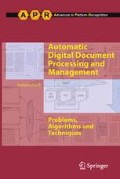Abstract
Documents are fundamental in our lives because they are the means to convey information and/or the formal evidence of something. Although they date back to the first times of human civilization, the current technological development has turned upside-down many classical aspects of document creation, management, processing and exploitation. In particular, the advent of computer systems has made much easier document production and transmission, which is an opportunity but also a source of problems. A problem is how to turn into a computer-suitable form all existing documents; another is the introduction of digital documents, as a replacement of legacy ones, in the well-established bureaucratic mechanisms that rule our society since several millennia. This is not easy, due to the many different kinds of documents at hand, and to the different perspectives and needs of the institutions interested in document management and of their users. Here, after reviewing various perspectives on documents and providing a historical survey of their evolution, various categories of documents are identified, and a particular focus on digital ones is given.
Access this chapter
Tax calculation will be finalised at checkout
Purchases are for personal use only
Notes
- 1.
Francesco Carnelutti (1879–1965), a famous lawyer and jurist, main inspirer for the 1942 version of the Italian Civil Law.
- 2.
Usually, the three terms denote different but strictly related concepts: data are just values; they become information when an interpretation is given to them, while knowledge refers to pieces of information that are inter-related both among themselves and with other experience.
- 3.
Another term sometimes exploited to convey the same meaning is physical. However, it is a bit odd because even intangible supports require a physical implementation to be perceived, e.g., air is the physical support of the intangible ‘sound’ documents, and magnetic polarization or electrical signals are the physical support of the intangible ‘digital’ documents.
References
Knowledge for development: Tech. rep. The World Bank (1998/1999)
Merriam-Webster’s Collegiate Dictionary, 10th edn. Merriam-Webster Inc. (1999)
Angelici, C.: Documentazione e documento (diritto civile). In: Enciclopedia Giuridica Treccani, vol. XI (1989) (in Italian)
Briet, S.: Qu’est-ce que la Documentation. EDIT, Paris (1951)
Buckland, M.K.: What is a ‘document’? Journal of the American Society for Information Science 48(9), 804–809 (1997)
Buckland, M.K.: What is a ‘digital document’? Document Numérique 2(2), 221–230 (1998)
Candian, A.: Documentazione e documento (teoria generale). In: Enciclopedia Giuridica Treccani (1964) (in Italian)
Carnelutti, F.: Documento—teoria moderna. In: Novissimo Digesto Italiano (1957) (in Italian)
Irti, N.: Sul concetto giuridico di documento. In: Riv. Trim. Dir. e Proc. Civ. (1969) (in Italian)
Shannon, C.E., Weaver, W.: The Mathematical Theory of Communication. University of Illinois Press, Champaign (1949)
Author information
Authors and Affiliations
Corresponding author
Rights and permissions
Copyright information
© 2011 Springer-Verlag London Limited
About this chapter
Cite this chapter
Ferilli, S. (2011). Documents. In: Automatic Digital Document Processing and Management. Advances in Pattern Recognition. Springer, London. https://doi.org/10.1007/978-0-85729-198-1_1
Download citation
DOI: https://doi.org/10.1007/978-0-85729-198-1_1
Publisher Name: Springer, London
Print ISBN: 978-0-85729-197-4
Online ISBN: 978-0-85729-198-1
eBook Packages: Computer ScienceComputer Science (R0)

